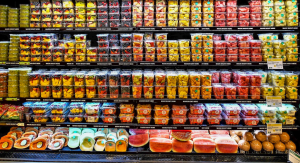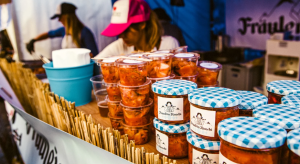Are you a foodie who loves to cook and experiment with new recipes? Have you ever considered turning your passion for food into a business? Starting a food business from home in the UK can be a rewarding venture if done right. From understanding the food market to registering as a food business, there are certain steps that you need to follow to ensure success. This blog post will take you through everything you need to know about starting a home-based food business in the UK. We will cover topics such as maintaining food safety and hygiene, diversifying your business in the future, and the benefits of starting a food business from home. So, whether you are an aspiring chef or just someone who wants to make some extra cash by doing what they love, this blog post is for you!
Understanding the Food Market

To successfully start a food business from home, it’s crucial to understand the food market. Conduct market research to gain insights into consumer preferences and demands. Identify current food trends and incorporate them into your offerings to stay relevant. Analyze the competition and find opportunities for differentiation to stand out in the market. Consider your target audience’s specific needs and preferences to tailor your products accordingly. Social media and online platforms are effective marketing tools to reach a wider customer base. By understanding the food market, you can position your business strategically and increase your chances of success.
What is Food Business?

Food business refers to any business that involves producing, processing, distributing, or selling food products. This can include everything from restaurants and cafes to grocery stores and food manufacturing companies. The food industry is a vast and diverse sector encompassing a wide range of businesses, each with unique challenges and opportunities. From farm-to-table restaurants to global fast-food chains, the food business plays a crucial role in providing people with the nourishment and enjoyment they need. It requires knowledge of food safety regulations, marketing strategies, and customer preferences to succeed in this competitive industry.
Why Should You Start a Food Business From Home?
You might want to start a food business from home for several reasons. First, it can be a great way to cook for yourself and your family without having to spend hours in the kitchen. Second, starting a food business from home can give you some independence and control over your work life. And finally, cooking from scratch allows you to create unique dishes that not everyone is likely to find at their local grocery store.
However, starting a food business from home is not without its challenges. First, it can be hard to get customers because many people don’t have the time or space to store and prepare food on their own. Secondly, running a food business from home can be expensive because you’ll need to invest in kitchen equipment and supplies. And finally, if you make any mistakes with your cooking or marketing strategy, your business may fail quickly. All of which make it important to do your homework before starting a food business from home.
How to Start a Food Business From Home in the UK?
If you are thinking of starting your own food business from home in the UK, there are a few things you need to consider first
1. Register as a food business

To start your home-based food business, you need to register with the local authority. This involves providing your contact details and descriptions of your food products. It’s important to comply with food safety regulations and obtain any necessary licenses or permits. Remember to update your registration details as required regularly. By registering your food business, you can ensure that you operate legally and meet all the requirements. This step will also give you peace of mind that you are following best practices and prioritizing the safety of your customers.
2. Undertake Food Hygiene Training
To ensure the safety and quality of your food business, it is crucial to undertake food hygiene training. You can learn about safe food handling practices by completing food hygiene training courses, including proper food storage, preparation, and hygiene procedures. Obtaining relevant certifications demonstrates your commitment to food safety and enhances your credibility as a business owner. It is important to stay updated on the latest food safety regulations and guidelines to ensure compliance. Additionally, training your staff on proper food handling techniques will further contribute to maintaining a high standard of hygiene in your food business.
3. Carry out a Risk Assessment
To ensure the safety and success of your home-based food business, it is crucial to carry out a comprehensive risk assessment. Begin by identifying potential hazards and risks associated with your operations. Assess the likelihood and severity of each risk to prioritize your mitigation efforts. Implement control measures to minimize or eliminate identified risks, such as proper food storage and preparation practices. It is important to regularly review and update your risk assessment as needed to address any changes in your business or regulations. Documenting the process and findings of your risk assessment will serve as a valuable reference for future needs.
4. Get to grips with Food Hygiene Ratings

To start a successful food business from home in the UK, it’s crucial to understand and comply with the legal requirements. Conducting thorough market research will help you identify your target audience and competition, allowing you to tailor your products and marketing strategies accordingly. Developing a comprehensive business plan that outlines your goals, pricing, and marketing efforts is essential for long-term success. Additionally, ensure that your home kitchen meets the hygiene and safety standards set by the Food Standards Agency. Obtaining the necessary licenses and registering your business with the local council will provide credibility and establish your presence in the industry. Connecting with other entrepreneurs through local food business networks or industry events can be a valuable source of knowledge and inspiration to grow your venture.
5. Keeping a record
To ensure a successful food business from home in the UK, keeping detailed records of your activities is crucial. First, research and comply with food safety regulations set by environmental health offices. Next, decide on a niche or speciality for your business, whether it’s baking homemade cakes or operating a food truck. Create a business plan and budget to guide your operations and track upfront costs. Obtain the necessary permits and licenses from local authorities to legitimize your venture. Finally, maintain records of financial transactions and inventory management to stay organized and monitor your business’s progress.
6. Selling food to consumers
To successfully sell food to consumers, it is crucial first to check the legal requirements and regulations for food businesses in the UK. Register your food business with the local council and obtain the necessary licenses to ensure compliance. Additionally, inspect your kitchen and ensure it meets the required hygiene and safety standards set by environmental health regulations. Once the legalities are taken care of, start developing a menu and create a marketing plan to reach potential customers. Consider partnering with local delivery services or setting up a website to sell your products online. Continuous evaluation and improvement of your products and customer service are essential to ensure the success of your home-based food business.
How to Maintain Food Safety and Hygiene?

Maintaining food safety and hygiene is crucial to prevent foodborne illnesses and ensure the health and well-being of consumers. Here are some important steps to follow:
- Proper handwashing: Wash your hands thoroughly with soap and water before handling any food. This helps to remove bacteria and prevent contamination.
- Separate raw and cooked foods: Keep raw meats, poultry, seafood, and eggs separate from cooked foods to avoid cross-contamination. Use separate cutting boards, utensils, and storage containers for raw and cooked foods.
- Cook food thoroughly: Make sure that all foods, especially meat, poultry, fish, and eggs, are cooked to the appropriate temperature to kill harmful bacteria. Use a food thermometer to ensure that the internal temperature reaches the safe zone.
- Store food properly: Refrigerate perishable foods promptly to prevent bacterial growth. Keep hot foods hot (above 140°F) and cold foods cold (below 40°F) to maintain their safety.
- Practice good personal hygiene: Avoid touching your face or hair while handling food. Wear clean aprons or gloves when necessary. If you have any symptoms of illness, such as diarrhoea or vomiting, avoid preparing or serving food.
By following these guidelines, you can help ensure that the food you prepare is safe for consumption and minimize the risk of foodborne illnesses.
How Can You Diversify Your Home Food Business in the Future?
There are a number of ways you can diversify your home food business in the future. One option is to increase your product line. You could offer additional types of food, such as dehydrated foods or frozen foods. You could also develop new products based on seasonal ingredients or flavours. Alternatively, you could focus on one type of food and expand your customer base by marketing to a specific demographic group, such as vegetarians or vegans. Another option is to franchise your business. This allows you to share the responsibility and expenses associated with running your business while retaining full ownership and control over the day-to-day operations. You could partner with another home food business owner to help share the load.
What Are the Components of Starting a Food Business?

Starting a food business involves several key components that need to be considered. Firstly, you must develop a solid business plan outlining your goals, target market, and financial projections. This will help guide your decision-making process and provide a roadmap for success. Next, you will need to secure the necessary permits and licenses to operate your food business legally.
This may include obtaining a food handler’s permit, registering your business with the local health department, and complying with any zoning regulations. Additionally, you will need to source high-quality ingredients and develop delicious recipes that will set your food apart from the competition. Finally, marketing and branding are crucial components of starting a food business. You will need to create a strong brand identity, establish an online presence, and implement effective marketing strategies to attract customers and build a loyal following. By carefully considering these components, you can set yourself up for success in the competitive world of food entrepreneurship.
The Benefits of Starting a Food Business From Home in the UK
Starting a food business from home in the UK can offer a range of benefits. Firstly, it allows entrepreneurs to save on the costs associated with renting or buying commercial space, which can be a significant expense for a new business. Additionally, operating from home provides flexibility and convenience, as you have the ability to set your own hours and work around personal commitments.
Another advantage is that starting small from home allows you to test the market and refine your products before scaling up. This can help minimize risk and ensure that your business is well-positioned for success. Finally, with the growing demand for locally sourced and artisanal food products, starting a food business from home can tap into this trend and attract customers who value quality homemade goods.
Conclusion
Starting a food business from home in the UK can be a rewarding and profitable venture. With the right planning, preparation, and adherence to food safety regulations, you can turn your passion for cooking into a successful business. From conducting market research to obtaining necessary licenses and certifications, there are several steps involved in getting your home-based food business up and running. However, with determination, creativity, and a focus on providing quality products, you can build a loyal customer base and thrive in the competitive food industry. If you’re ready to take the leap and start your own food business from home in the UK, now is the time to get started. Embrace your culinary skills and turn your dream into a reality.









